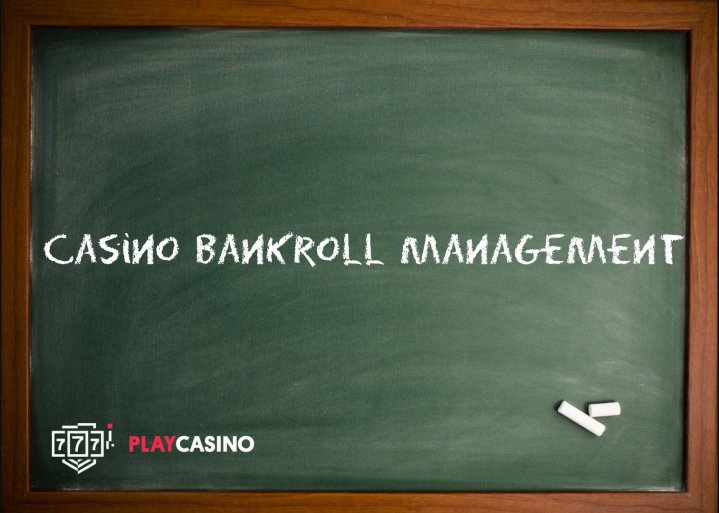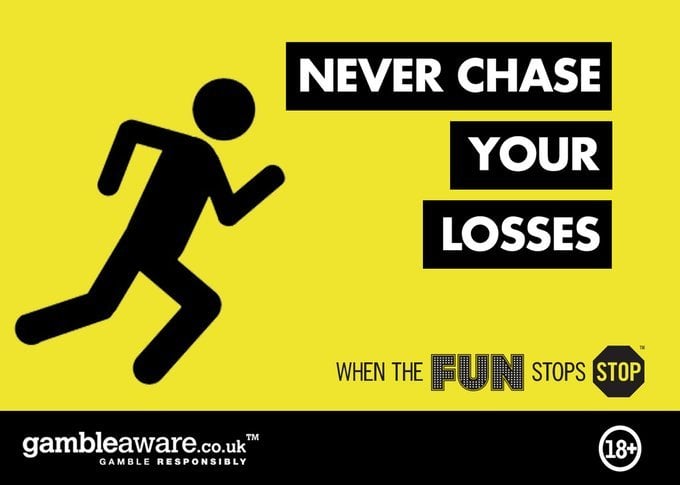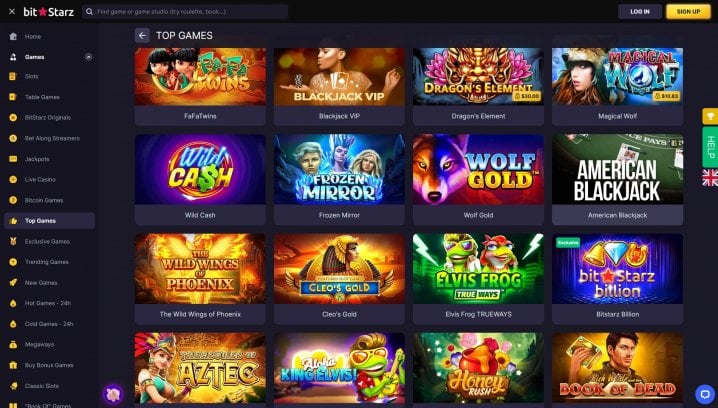Casino Bankroll Management
To most people, online gambling is more of a hobby, pastime, or a way to relax after a hard day's work. They implement a successful bankroll management plan and stick to it by making smarter decisions. To be honest, that is exactly as it should be, nothing more than some entertainment that carries the potential bonus of making some money. Sensible gambling at online casinos will occasionally bring some rewards.
However, there are others that gamble willy-nilly without thinking about the potential financial implications and, more importantly, risk developing a gambling problem due to their reckless gambling habits.
Hopefully, by reading this casino bankroll management guide and taking heed of the tips and advice we give you, you will fall under the former category of gamblers, and not the latter. We give you valuable information on managing your bankroll so that you do not lose money you cannot afford to lose.

What is Online Casino Bankroll Management?
Although bankroll management is a term, it's nothing more than a sensible approach or attitude toward gambling. It is the act of consciously managing your gambling funds, so you do not spend more than you can afford to lose.
As an example, which of the following two examples is of somebody taking a sensible approach to his favorite pastime and which could lead to financial trouble if they do not reign in how much they gamble?
- Exhibit A: Assigns himself with a €/$500 bankroll for online gambling for the month. This is some spare money left from his salary after paying all bills, rent, and other expenses. He rigidly sticks to his own bankroll rules and finishes the month in profit.
- Exhibit B: Has no specific bankroll and just deposits at the online casinos whenever he feels like it. After a losing streak, he deposits more to try to chase the accrued losses. He repeats this process another couple of times, but now he is dipping into money he needs to pay important monthly expenses.
From afar, it is easy to criticize somebody that acts similarly to exhibit b. On the outside, managing your bankroll looks like an easy thing to do. Most of us know how to live within a budget without overdoing our expenditures each month.
However, when gambling, whether online or at a land-based casino, that winning feeling is addictive. It is not difficult to lose track of how much you're spending when chasing the ultimate buzz. Some handle this better than others, no matter what walk of life they're from. This is why it is fundamentally important that everybody take the time to learn some valuable tips about bankroll management as early as possible. This is to ensure that your favorite pastime remains just that and does not deteriorate to harmful levels that could have a devastating impact on your life.
How to Establish the Size of Your Casino Bankroll
Now, as everybody has a different budget, there is no one size fits all practice when it comes to the size of a bankroll. One person could have a more expendable income than another, while another player might be more frugal than the average punter.
However, the general rule of thumb is you should only gamble online using money you can afford to lose. Even if you can afford to lose more, you might prefer not to. The reason for this is simple. When you log into your online casino account or through the doors of your favorite land-based casino, there is a good chance your bankroll has disappeared by the time you log off or walk out.
For that reason, establishing a bankroll budgeting practice is the best way to prevent you from losing money you cannot afford to lose.
There are two ways you can go about deciding the size of your bankroll:
The Simple Approach: The easiest way is to calculate how much cash you have left after paying your monthly expenses. Take your bankroll out of your 'spending money' that is left once you have paid all your bills, rent, food costs, and any other monthly expenses. That way, if you stick to your bankroll, you're not risking money you should be using for your needs.
The Refined Approach: Another way is to calculate how much money you will need for playing a certain number of hands/spins/bets within a set period.
For instance, if you're planning a three-hour session playing blackjack tables, you can calculate how much money you will need. You will play just over 100 hands per hour at an average blackjack table. That means you would need €/$300 to cover all your bets on a €/$1 table.
Obviously, you will not lose every game, so you can go further. The average win rate at a blackjack table is 44%, so assuming you win 1:1 for the 132 hands, you should win on average, that means you can minus €/$132 from the €/$300 to give you a bankroll of €/$168. That should last your session, but, of course, each session is different. Perhaps €/$200 is a safer number using this example?
Essentially, as long as your bankroll is money you can afford and not reserved for other expenses, you're good to go!
Tips on How to Manage Your Casino Bankroll
Your bankroll is the money you have set aside for gambling. Do not confuse it with how much money you have in the bank. This is the money you can afford to finish the night without. By using the following tips, you will ensure that even when a losing streak hits, you have done nothing more than lose what you budgeted you could afford to lose.
Bank When You Win

If one engages in gambling extensively, they will eventually encounter a concept called "the house edge." This term refers to the statistical amount one can anticipate losing to the casino based on the odds of the games being played. Games vary in their house edges, some being higher and others lower, but all are designed to tilt the odds against the player, making it challenging to achieve long-term winnings.
However, in the short term, a combination of luck and strategy can lead to victories. Yet, if players continue gambling with their winnings, fate is likely to turn against them, resulting in the loss of all previous gains. To avoid this scenario, it is crucial to know when to stop and bank the winnings.
An effective approach to achieving this is by setting a predetermined limit for winnings. For example, suppose a player starts with a €/$100 budget and decides to bank their earnings if they reach a $50 profit. By doing so, they still have the original €/$100 to continue playing, and if they encounter losses afterwards, they still have the €/$50 they banked as a consolation prize. This tactic helps reduce the impact of the house's edge and enhances the chances of keeping some winnings.
Accept You're Likely to Lose

One of the biggest mistakes players (specifically players new to gambling) make is starting a session believing and sometimes assuming they're going to end with some big wins. This is totally the wrong mindset, as even the odds and statistics suggest it is more likely you will not win and could potentially lose your entire bankroll. This puts unnecessary pressure on yourself and could lead to you chasing losses, placing riskier wagers, and spending money outside of your bankroll.
The key is to accept your bankroll may not exist at the end of the night and accept that fact. It is money you set aside to have some enjoyment - that's it. Do you expect your money back after watching a movie or going to a music concert? No, you paid for the entertainment value. If you can treat playing at a casino in the same way, you will handle losses better. Plus, when you do win, it feels better, as you were not expecting it.
Never Chase Losses

If there is one thing that derails the personal finances of most casino players, it is chasing losses. Whether playing online or at land-based casinos, the first rule you need to abide by is to avoid chasing losses. We all know what it is like to lose at the casinos, after all, all the games have a house edge that ensures the casino has better odds of winning.
If you're the type of player that says something like, "I've lost $300, but I know I'm on the verge of a winning streak. I just need to withdraw another $100, and I'll get back everything I lost and make some profit on top too".
There are three main issues with saying things like that:
- Your supposed bankroll management plan has gone straight out the window. You're meant to set a budget and stick to it - not draw out more money.
- You have no idea whether you're about to go on a winning streak. Each hand, spin, or turn is independent of one another. You're more likely to continue your losing run than suddenly hit a gold patch.
- When you chase losses like this, you become desperate. Desperation leads to poor decisions, such as placing larger bets or going for long-odds betting options.
If you can learn to avoid chasing losses, it is one of the biggest hurdles you can jump on the road to becoming a player that can manage your bankroll effectively. It will also help your win/loss record, which usually gets worse when you chase. By quitting, you might come back on your next session and reduce those previous losses.
Place the Right Bets
There is a fine balance between betting too much and not betting enough. Of course, you should definitely avoid placing bets that are so big you could end up losing your bankroll too quickly. However, small bets can lead to boredom as you're not really hitting the big numbers when you do get lucky. This often leads to players increasing their bets - something that could result in betting too much for the size of your bankroll.
The key is to bet enough money, but not so much that it could bring an end to the entire session too quickly. The exact amount you bet will depend on your bankroll and how long you plan to play, but as standard, if you stick to around 5% of your bankroll, you're on the right path. Note that if you're playing video slots, you shouldn't bet more than 1% of your bankroll - simply because you will place more bets per hour when compared to other casino games.
Choose The Right Games

Everybody is different and has their own preferences when it comes to their favorite casino games. Some of you might prefer to sit on the slots spinning the reels, while others might prefer to play games such as blackjack, craps, roulette, or baccarat.
If you're unsure of what to play, there are certain questions you can ask yourself to determine what is the right fit for your next session at your chosen online casino.
- How long do you plan to play?
- What is the size of the bankroll you plan to use?
- Will you go big and hope for a large return in a short amount of time?
- Are you looking for a game you can play for an extended period with a smaller bankroll?
- Will you choose games that offer the best return to player (RTP) percentage?
Once you have answered all the above, you will have a much clearer idea of the type of games that will suit your session.
Before deciding, make sure you consider the RTP and the volatility of the games you're considering. The RTP (return to player) is essentially the house edge of the game in reverse. So, a game with a 95% RTP gives a house edge of 5%. The higher the RTP, the more theoretical money you should win back over an extended period of time. Alternatively, a high house edge means the casino is expected to make more from players playing casino games over an extended period.
As for the volatility, this equates to how frequent and how big the wins are when you're lucky to hit them. A low-variance casino game will payout more frequently but with smaller wins on average. Playing a highly volatile game will produce larger wins but less frequently. As you've probably figured out, a game with medium volatility falls somewhere in the middle of the two.
If you're looking for low-volatility casino games with a high RTP, we recommend playing table games such as blackjack, roulette, and baccarat. However, if you'd rather chase bigger wins, video slots are probably the best bet. Just note, the RTP of video slots at online casinos averages around 96%, while table games usually offer a higher RTP. For example, if you use a basic blackjack strategy, you can expect an RTP of 98.5% over the long term.
Take Advantage of Casino Bonuses

If you want to provide an instant boost to the size of your bankroll, you're better off playing at an online casino rather than your local brick-and-mortar casino. Why? Because you will often find that online casinos offer bonuses and promotions you can take advantage of. The iGaming industry is extremely competitive, so sites create attractive bonuses and promotions to attract new players and reward those that stick around.
Below are the most common casino bonuses you will find:
- Welcome Bonuses: These are usually the best bonuses you will find, as they're designed to attract new players. For that reason, these usually offer a good chunk of bonus money, lots of free spins, or a combination of both. You receive a welcome bonus in return for making your first (or sometimes first few) deposits.
- No Deposit Bonuses: Another great casino bonus designed to attract new players is what is called a no deposit bonus. You do not even have to deposit your own money, as you will receive a small amount of bonus money or free spins just for creating a casino account.
- Reload Bonuses: These work the same way as welcome bonuses but are for everyone and not just new players. As reload bonuses are not designed to bring in new players, these usually offer lower amounts of bonus funds or free spins when compared to welcome bonus packages.
- Cashback Bonuses: Some platforms also offer cashback deals. Rather than receiving bonus cash up front, you can claim back a percentage of your previous losses accrued the previous day/week/month.
- VIP/Loyalty Programs: Like loyalty cards, you might get at retail stores that give you points when you spend money, online casinos often have a loyalty/VIP program that does similar. When you play, you earn loyalty points and climb tiers when you reach certain milestones. Each milestone gives you additional perks, such as faster withdrawals, exclusive bonuses, and more. Plus, in many cases, you can convert loyalty points to bonus cash.
Keep a Clear Head When Betting

If you have a lot on your mind, have too many distractions around you, or are intoxicated, you run the risk of breaking the rules you set out in your bankroll management strategy. You need to keep a clear and functioning mind when gambling, or you could make bad decisions such as betting too much, chasing losses, or using money outside of your bankroll.
If you can keep a clear head, you have a better chance to successfully manage your bankroll. You will find it easier to stick to your plan and ensure you do not break any self-imposed rules.
Record All Wins and Losses

When individuals try to maintain a healthy diet, experts often advise them to record everything they eat. Similarly, in the context of gambling, keeping track of wins and losses is crucial. Understanding where you stand in terms of your overall gains and losses can prevent you from going too far and making unwise decisions.
During intense gambling sessions, it can be challenging to accurately track the exact amounts spent. However, allocating a specific budget for each game you intend to play can be immensely helpful. Monitoring the game counter on a machine or counting your chips can also provide useful information.
By doing a bit of simple math, you can ensure that you never unknowingly exceed your predetermined budget. But ultimately, it requires self-control to stick to your betting limits. Combining these skills enables you to practice effective casino bankroll management at an advanced level. Following these strategies can enhance your gambling experience and minimize the risk of excessive losses.
How to Build a Casino Bankroll?
Now that you have a clearer understanding of what bankroll management is and how to use it effectively, you might want some tips on building up the bankroll you have. Well, as always, we're here to oblige:
- Avoid drinking or taking drugs when playing: While it is fine to have a couple of beers as part of the enjoyment when gambling, try to keep your head as clear as possible. If you've had too much, you're more likely to do the opposite of managing your bankroll effectively.
- Keep an eye on your gambling habit: If you're gambling more than you should and it has become an addiction rather than a form of entertainment, seek help from a gambling addiction organization. Also, visit the responsible gambling page at online casinos to get advice and use the responsible gambling tools they offer.
- Keep control of your emotions: If you're the type of person that struggles to deal with losses, gambling is not for you. You must accept that you're probably going to lose more than you win. Take the rough with the smooth, and enjoy the games for what they are. Do not use them as a method to make money. In fact, before you start playing, just accept you're probably going to lose your bankroll - if you don't, it's a big bonus!







